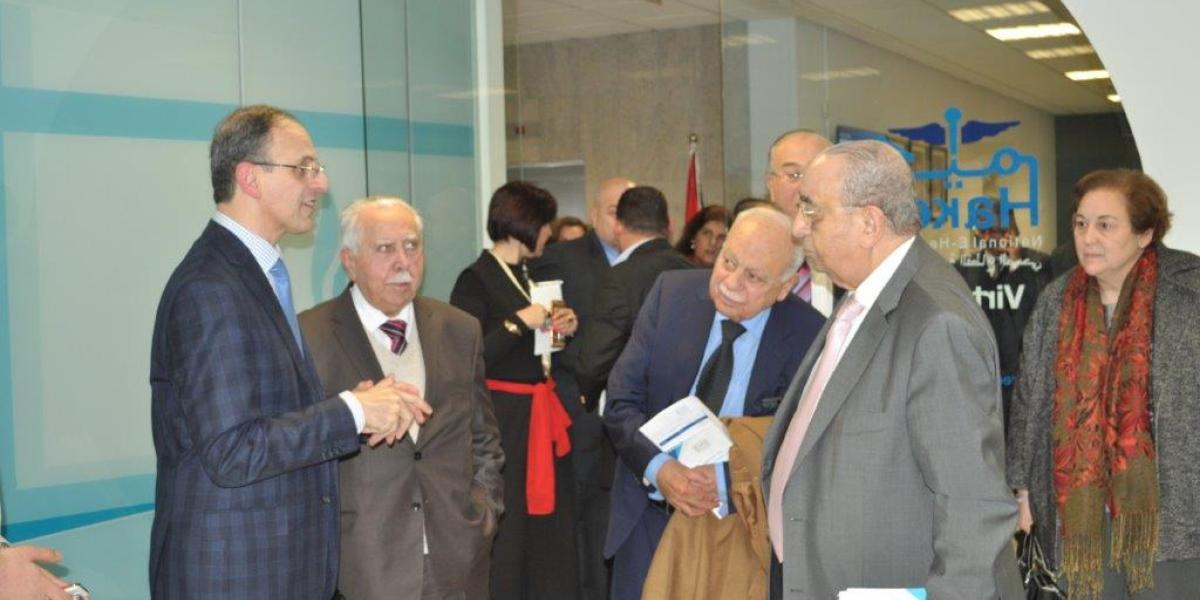Electronic Health Solutions Company (EHS) Presents Its Achievements before the Jordanian Senate

Electronic Health Solutions (EHS) showcased its achievements in Jordan e- health program before the Committee of Health, Environment and Population of the Jordanian Senate during their recent visit to company’s headquarters.
Eng. Feras Kamal, CEO of the company, presented overview of the company’s strategy for the year 2017 before the committee which has recently visited the company headed by Dr. Yousef Goussous in the presence of the committee’s members. The strategy includes the medical facilities where e-health program will be completed and the projects where the program will commence.
From his side, Dr. Goussous, Chairman of the committee, emphasized that Electronic Health Solutions Company’s (EHS) achievements over the past eight years are considered a national success story and even in the Arab Region, where King Abdullah II aspirations for the Jordanian health sector have become a reality
He added that the future perspectives for e-health program application “Hakeem” are to exceed hospitals affiliated to the Ministry of Health and hospitals affiliated to the Royal Medical Services to include the private sector, so that we have a medical database at the national level in Jordan, and he thanked all concerned parties for their efforts in implementing the e-health program.
He also emphasized that e-health program “Hakeem” has led to reducing costs of dispensing medicines such as the case at Prince Hamzeh hospital where some numbers in a previous neutral study shows that saving on dispensing medicines has reached 24%, which necessarily means implementing this program in all medical facilities in Jordan.
Kamal said: “EHS company and its staff of nearly 350 employees is implementing three initiatives at a national level in order to enhance the quality of healthcare provided to Jordanians of which “Hakeem” program is one of the most prominent, Jordan Electronic Library “Elm” in addition to Hakeem Academy. He pointed that the 2017 company strategy includes the automation of Al Bashir Hospital which is affiliated to the Ministry of Health and King Hussein Hospital at King Hussein Medical Centre by July 2017”.
He added that the company’s work is governed by certain structural governess and regulations, where a steering committee has been formed at the beginning of 2016 to follow-up on the company’s performance and the progress of the all kinds of its projects. The committee includes Minister of Communications and Information Technology as the Head and the membership of Secretary General of Ministry of Health, Secretary General of Ministry of Planning and International Cooperation, Secretary General of Ministry of Finance, Secretary General of Ministry of Communications and Information Technology, Director of Royal Medical Services, the General Manager of King Abdullah University Hospital, the General Manager of Jordan University Hospital, the Director General & CEO of King Hussein Cancer Center and the Chairman of the Board of Directors of Electronic Health Solutions Company.
He also mentioned that this year will witness a qualitative leap in the company’s work. Karak will be the first governorate to be fully automated; its medical facilities will be among the 75 locations which include hospitals, comprehensive and primary healthcare centers and hospitals affiliated to the Royal Medical Services – which will be automated during the current year.
Eng. Kamal explained that the company was able to automate 102 healthcare facilities by the end of 2016 which includes: government hospitals, hospitals affiliated to the Royal Medical Services, and comprehensive and primary healthcare centers across the kingdom’s governorates.
He added that the most important benefits of implementing e-health program “Hakeem” at a national level can be summarized in four main points; improving the level of healthcare services and contributing to reducing medical error, reducing healthcare costs, enhancing the patient’s medical experience when receiving healthcare and supporting research and policies. As for medical institutions, it helps to monitor and control expenditure regarding the dispensing of medicines, x-rays and lab tests by millions of Jordanian dinars. Operating costs would be reduced in health institutions by controlling repeat dispensing and the optimal use of resources through archiving files and x-rays electronically and monitoring expenditure resulting from repeat laboratory testing. A neutral study has revealed that “Hakeem” program for example has contributed to controlling medicines expenditure at Prince Hamzeh Hospital by 24% following the implementation of the program.
Kamal confirmed that the work of the company’s staff is not limited to the implementation of e-health program “Hakeem” but it goes beyond research and development. A team of data analysts at the company prepared a number of specialized studies some of which were presented at international conferences, while the technical team has developed a number of systems and supporting applications for the program such as “Dr@Hakeem” through smartphones for doctors.
Members of the Committee of Health, Environment and Population checked the organizational structure of the company and the work of its various departments in addition to presenting a simulation display at “Hakeem” virtual clinic.
Eng. Feras thanked the members of Jordan Senate for visiting the company’s headquarter emphasizing that the company to open to all entities willing to know more about EHS company and its various initiatives.